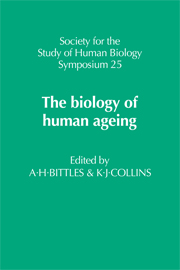Book contents
- Frontmatter
- Contents
- Preface
- Ageing as a consequence of natural selection
- Genetic information in ageing cells
- Insects as models for testing theories of ageing
- Human cell culture systems in the study of ageing
- Estimation of biological maturity in the older child
- Biological age assessment in adulthood
- Skeletal age and palaeodemography
- Cell death and the loss of structural units of organs
- The prospects for mortality decline and consequent changes in age structure of the population
- Where do old people come from? An evaluation of American population projections
- Age structure of Soviet population in the Caucasus: facts and myths
- The health of an ageing population
- Can we tell our age from our biochemistry?
- Dietary manipulation of ageing: an animal model
- Customary physical activity in the elderly
- Effects of ageing on human homeostasis
- Index
Preface
Published online by Cambridge University Press: 06 August 2010
- Frontmatter
- Contents
- Preface
- Ageing as a consequence of natural selection
- Genetic information in ageing cells
- Insects as models for testing theories of ageing
- Human cell culture systems in the study of ageing
- Estimation of biological maturity in the older child
- Biological age assessment in adulthood
- Skeletal age and palaeodemography
- Cell death and the loss of structural units of organs
- The prospects for mortality decline and consequent changes in age structure of the population
- Where do old people come from? An evaluation of American population projections
- Age structure of Soviet population in the Caucasus: facts and myths
- The health of an ageing population
- Can we tell our age from our biochemistry?
- Dietary manipulation of ageing: an animal model
- Customary physical activity in the elderly
- Effects of ageing on human homeostasis
- Index
Summary
During the last decade there has been a marked upsurge of interest in the topic of human ageing. This is largely due to the realization that the elderly comprise an ever-increasing proportion of the population and, at least in industrialised nations, age-related disorders now account for a substantial component of the expenditure on health care. In recent years, trends in ageing research have appeared to focus either at the cellular and sub-cellular levels or on specific topics in geriatric medicine. The aim of a two-day symposium held at Chelsea College, University of London, in April 1984, organised on behalf of the Society for the Study of Human Biology and the British Society for Research on Ageing, was to help bridge these two specialist areas by considering human ageing within the interdisciplinary context of human biology. In the proceedings presented in this book, the editors (also the organisers of the symposium) have brought together scientific papers presented by a group of distinguished research workers in gerontology and geriatrics. Although it obviously was not possible to achieve a fully comprehensive treatment of the subject, many of the underlying principles and current views on human senescence are considered, including stochastic and non-stochastic theories of ageing, biological markers in age assessment, and demographic, social and clinical features of ageing populations.
To biologists of whatever persuasion, it is evident that a phenomenon which is common to all species must be associated with, if not an integral part of, the evolutionary process. Accordingly, the initial chapter is concerned with a model to explain ageing in terms of energy investment and natural selection.
- Type
- Chapter
- Information
- The Biology of Human Ageing , pp. vii - viiiPublisher: Cambridge University PressPrint publication year: 1986

